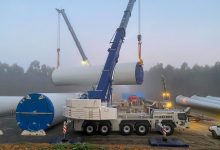Australia’s as yet unlegislated renewable energy target of 82% is within its grasp, capable of creating a new national identity and setting the country up as an economic powerhouse, but “courage and leadership” are needed if Australia is to become “a global clean energy superpower.”
Speaking at the Australian Clean Energy Summit on Tuesday, Clean Energy Council chief executive Kane Thornton said the country’s overall emissions reduction target of 43% by 2030 and its renewable energy target of 82% for the same date are “ambitious for sure”, but doable.
However, Thornton said the current rate of new commitments to wind and solar projects in 2023 is just a fraction of what is needed, and called on the federal government to extend the renewable energy target that effectively expired in 2020.
Thornton took aim at “the cynics, vested interests, the fossils and the fools” – Thornton rubbished those who claim 82% renewables can’t be done and those who call it too ambitious, too costly, or invent “better solutions”.
If we had listened to those same naysayers, says Thornton, “we wouldn’t have built the hydro schemes, a bridge over Sydney’s harbour, or the overland telegraph that first connected us to the world. We wouldn’t have Wifi.
“These acts of courage and foresight now define our nation, he said, adding that the emission reduction and renewable energy targets will similarly “create a new national identity and set us up as an economic powerhouse for centuries.”
Thornton admitted that the current ambition is “made all the more ambitious by the lost decade. A decade we should have spent planning and preparing was instead blown in denial, political bickering, and an aversion to anything that looked like sensible, consistent energy policy and forward planning.”
This had since been amplified by one of the most significant energy shocks in history caused by the Russian war in Ukraine and the subsequent sanctions [which] saw energy supply and prices thrown into chaos around the world.
“Smart countries captured a share of the windfall gains and directed them toward clean energy,” said Thornton.
“Australia missed our chance.”
Thornton said the biggest risk for Australia now is the competition for capital. And it is already losing out.
“The United States IRA is an enormous magnet for clean energy capital, workers, technology, researchers. All of it,” he said.
“We are now in a global clean energy investment race – and are losing. And to add to our woes, Europe and many other countries are following suit. If they can’t beat them, they are joining them.
“To become a clean energy superpower, we will need to do more than dig and ship our mineral resources. More importantly, we will only become a clean energy superpower if we decarbonise our own energy system. Fast.”
Thornton said the federal Labor government has “come to terms” with the implications of the US Inflation Reduction Act but Australia is still not building renewable energy quickly enough to replace coal and natural gas.
Although Australia has been “averaging around 3GW of rooftop solar and 3GW of large-scale renewables per year” that number “needs to double to put us on track to 82% renewable energy by 2030.”
“At a time when we should be doubling investment, the headwinds have seen the rate of new commitments slow in 2023. Just 0.4GW of new large-scale renewable energy projects have been committed in the first half of 2023. That’s a long way short of the 5GW per annum we need.”
Thornton said the 82 per cent target needed to be supported by a national policy mechanism, and called for the renewable energy target – which was met in 2020 – it to be extended to 2030
“Australia’s previous Renewable Energy Target was met in 2020 and is now phasing out,” Thornton said. “No policy has delivered as much abatement, given as much certainty and unlocked as much investment as the RET.
“Extending it beyond 2030 would be simple and fast, and the benefits to energy prices and the Australian economy will outweigh the costs associated with this extension.
“We are race ready, we are fit, and our potential is limitless. We now need courage and leadership to become a global clean energy superpower. Oh, and to ignore anyone who tells you it can’t be done.”










